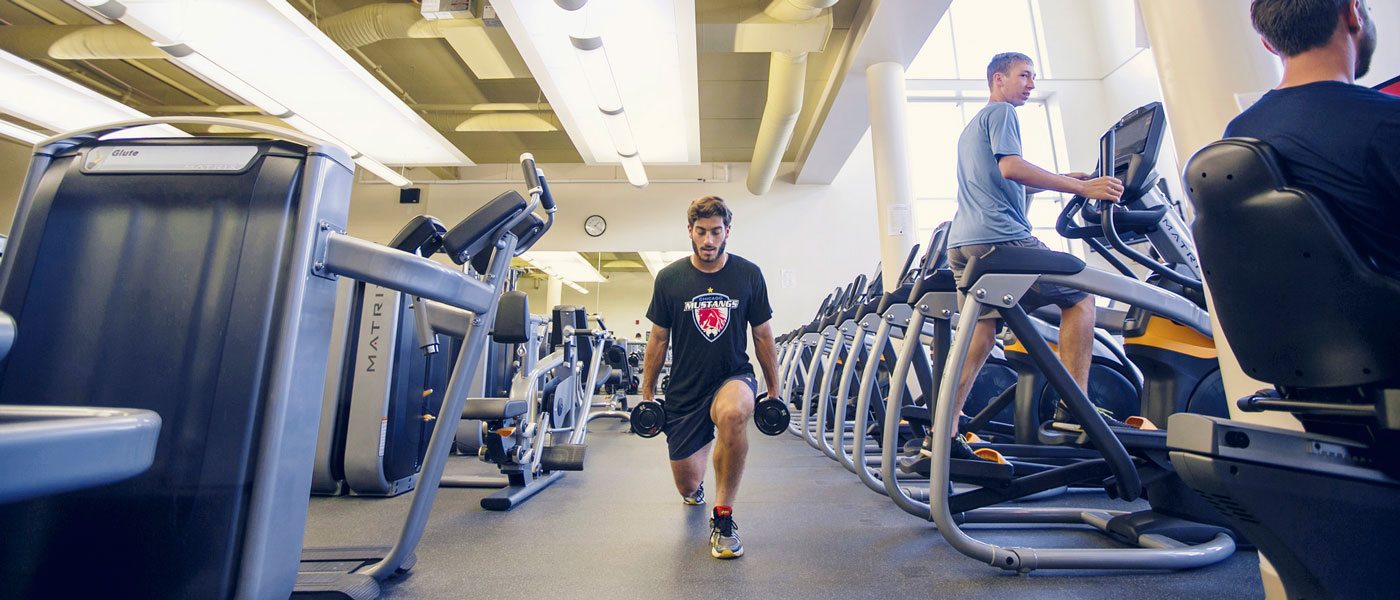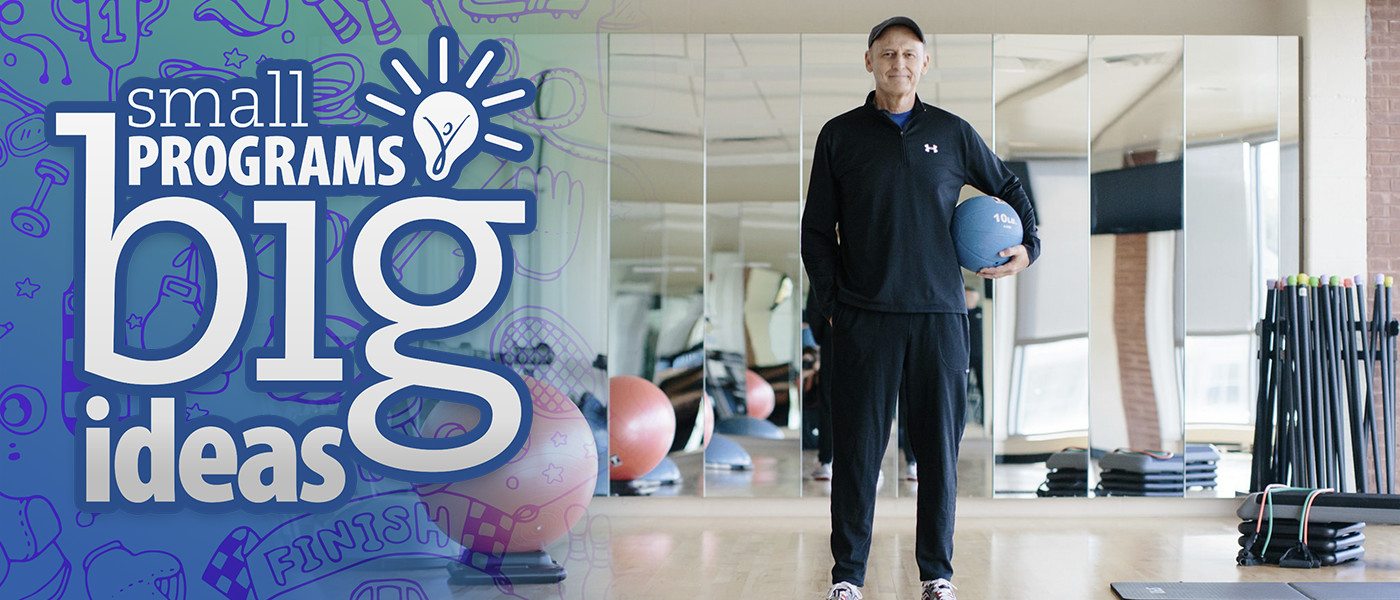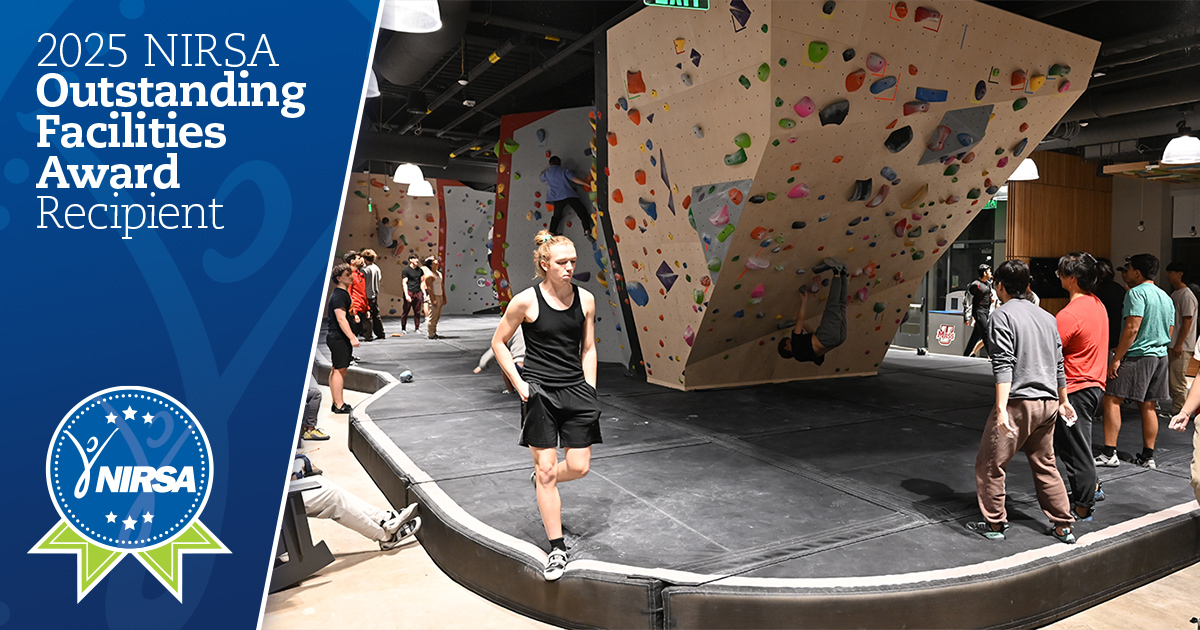As NIRSA celebrates the diverse culture of campus recreation programs and the ways that the Association supports their unique needs, we’ve asked staff members at small programs to share their stories with the broader NIRSA membership.
We sat down with Brenna Lacey, Director of Fitness at Missouri Baptist University (MBU), a private school in St. Louis, with just over 1,200 undergraduate students to get to know a little bit more about how she found herself at MBU and to hear about what’s happening in the world of recreation and wellness on her campus.
About Brenna
NIRSA HQ: Tell us a little bit about yourself Brenna. How did you find yourself working in fitness at Missouri Baptist University?
Brenna: My journey in collegiate recreation began at Belmont University as a student employee in the Beaman Student Life Center. For three years, when I wasn’t in class or on the clock teaching climbing wall basics, welcoming guests at the check-in desk, or minding the fitness center, I could be found conquering a new climbing route, learning to play racquetball, sweating in group fitness, spinning, or lifting weights.
I was right at home in the student-driven culture of wellness, the team mentality, and how the rec leadership staff seemed to enjoy coming to work! After completing my M.S. in Exercise, Nutrition, and Eating Behaviors at The George Washington University, I returned to my hometown of St. Louis, MO, in 2011 to become the first and—to this day—only recreational fitness professional in Missouri Baptist University history
In my initial role as Fitness Coordinator, I managed the day-to-day operation of the fitness center and the group fitness program. Armed with a relative understanding of private—and specifically Christian—higher education, a passion for health and wellness, and decent knowledge of group fitness formats, I stepped into a beautiful new facility with brand new equipment and was offered a handful of student workers.
Five years later and with tremendous support, the fitness programs moved from being a subset in the department of Special Events to an independent department within Student Development. The move let us establish a clear vision and purpose for how we fit into the institutional mission by providing opportunities for social, mental, and physical development through fitness, wellness, and recreational activity.
About Missouri Baptist University Recreation
That’s terrific! And what about MBU? What is the overall campus recreation and wellness scene like there?
Missouri Baptist University is a private Christian university located in west St. Louis county, Missouri. The main campus enrolls just over 1,200 undergraduate students, 400 of whom live on campus. The 50,000 square-foot Carl and Deloris Petty Sports and Recreation Complex opened its doors in late 2011 and launched the school’s official introduction to recreational fitness.
Prior to the facility opening, the minimal selection of cardio and strength equipment was for athletic use only, no group fitness classes were offered, and intramural sport seasons were casually run by two residence hall directors.
For the first time in MBU’s young forty-seven-year history, the entire campus community had free access to a fitness center with brand new cardio equipment, free weights, and selectorized strength machines, plus a variety of fitness classes complete with a panoramic view of the athletic fields. The SRC also includes a 1,000-seat gymnasium, suspended indoor track, athletic training suite, offices for athletic department staff and the Health and Sports Sciences division, classrooms, and locker rooms.

Opportunities and challenges
That sounds like an amazing facility and real opportunity to put your mark on an emerging program. What are some of the other unique opportunities or challenges of working with the Missouri Baptist community?
I wear numerous hats now as the Director of MBU Fitness, as is common in many small programs. I currently hire, train, and supervise a dozen student workers, one graduate assistant, several part-time group fitness instructors, and the intramural sports coordinator.
I assist with policy and procedure development, prepare and maintain oversight of the departmental budget, manage equipment maintenance and repair, analyze and report facility data, and maintain payroll. I also teach at least one group fitness class a week, create and distribute marketing materials, plan special events and programs for the campus community, serve as staff advisor for the Exercise as Medicine at MBU student organization, and offer employee wellness mini-programs throughout the year.
Being the sole professional staff member in fitness and recreation definitely has its perks when it comes to timely decision-making and professional development fund allocation! Yet, a significant drawback is the absence of like-minded colleagues who truly understand how campus recreation supports leadership and student development, inclusive competition, and lifelong habits of wellbeing.
Fitness and recreation was an understood component of university life in both my undergraduate and graduate experience, yet we are still in the process of establishing what fitness and recreation is at MBU, educating the campus community on how the fitness and recreation department differs from athletics, and reinforcing the importance of its existence to every person and department.
The NIRSA effect
That leads me pretty naturally to my next question—how did you get involved with NIRSA and how have NIRSA colleagues helped you to improve the offerings and experiences that you and your team foster for the Missouri Baptist community?
Fortunately, NIRSA was put on my radar in college as the premier organization for recreational fitness at the university level. However, I had no idea what a monumental resource it would be when I suggested that Missouri Baptist invest in an institutional membership. Little did I know it meant becoming a welcome member of the gold-standard network of professionals who embrace and support each other, regardless of school size or programs offered.
The online Connect community affords a vast network of colleagues to turn to for guidance, education, and conversation that is not present in my small school program. Furthermore, I gain tremendous insight through the daily emails which are topic specific. The Fitness Community of Practice often brings topics to light that push me to evaluate our programs and operations for best practices, while the Community & Small Colleges Community of Practice connects professionals like myself who are often operating within a similar structural and budgetary framework.
The NIRSA regional conferences and the Annual Conference have been impactful to my professional career at Missouri Baptist University and to my personal leadership development. I leave these opportunities overwhelmed with ideas, thoughts, and a renewed positive vision for the MBU programs. More importantly, I leave with a host of new friends in the world of fitness and recreation, who extend their hands to let me know that we are in this unique line of work together, no matter what school is branded on our lapel.
Each connection I have had the privilege to make among the NIRSA community embraces who I represent and offers a mutual respect for the commonalities that extend far beyond the size of the school we traveled from. The extent of this confidence NIRSA members have in each other as professionals and the value placed on continued professional relationships can only be understood by experiencing it firsthand.
A bright future
So, what do you think the future holds for campus recreation and wellness at MBU?
I recall how surprised and relieved I felt early in my career when I visited a large local university and found that the struggles and successes I was facing were present in many of the same ways at a larger institution. I come back to that thought often when I encounter resistance or fail to meet goals set for Missouri Baptist University’s fitness and recreation program.
The reality is that our program did not exist until November of 2011. Every step, no matter how small, is a step in the right direction towards providing opportunities for the social, mental, and physical development of students and employees through fitness, wellness, and recreational activity.
Armed with the support of the MBU administration, students, and vast network of leaders in collegiate recreation, and unending NIRSA resources, the future of fitness and recreational sports at Missouri Baptist University is bright!
- If If you work at a small program and would like to share your story contact NIRSA Membership Services Coordinator Megan Granholm or consider “pitching us your ideas” for the opportunity to highlight what’s happening on your campus.
Megan Granholm is currently the Membership Services Coordinator at NIRSA. You can reach her by emailing megan.granholm@nirsa.org.








